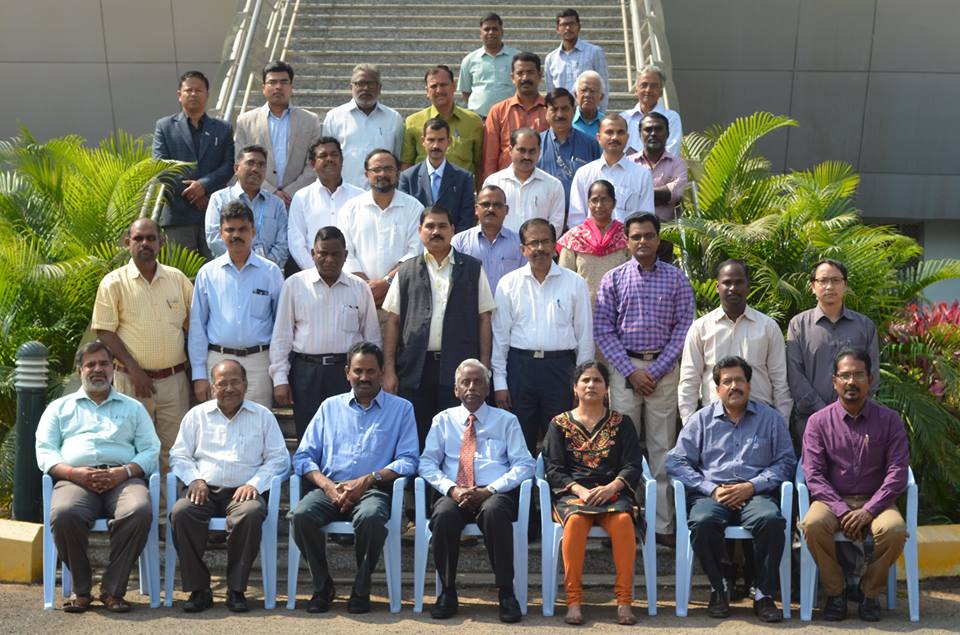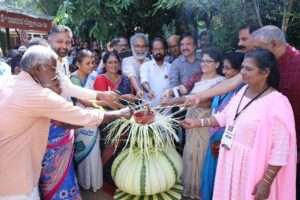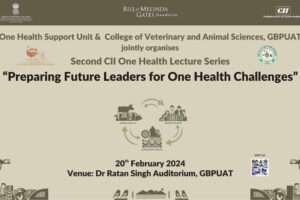Dr Lalit Kumar Tyagi participated in the Capacity Building Conclave organised by the NFDB and he shares his impressions here.
CONTEXT

Human resource development (HRD) is an essential component in the development of any sector and the fisheries sector is no exception. However, the role of HRD has not received its due attention in the fisheries sector. The sector is very complex and so are its HRD needs. Though there are several organizations undertaking various HRD activities to train and develop stakeholders at different levels in fisheries, these efforts are sporadic and hence lack a visible impetus to the growth of the sector. Realizing this, the National Fisheries Development Board (NFDB), Hyderabad, organised this meet where representatives from selected organizations (ICAR fisheries research institutes, Colleges of fisheries, State fisheries research & training institutes, state fisheries poly-techniques, selected KVKs) involved in the capability development activities in the fisheries sector were invited to participate.

©NFDB
Box 1: Fisheries Sector in India
Fisheries and aquaculture has become an important economic activity in the country. Its contribution not only to the food basket but also to the export earnings of the country has been acknowledged over the years. Fisheries has witnessed an impressive transformation from a traditional activity, to the one, based on well-developed and diversified infrastructure. India is blessed with rich inland, as well as, marine fishery resources.
Aquatic resources of the country include 8129 km of coastline; 2.02 million sq. km. of exclusive economic zone; 1,91,024 km of rivers and canals; 3.15 million ha of reservoirs; 2.35 million ha of ponds and tanks; 1.3 million hectares of oxbow lakes and derelict waters; 1.24 million ha of brackishwaters; 0.29 million ha of estuaries and 0.72 million hectares of upland lakes that could be utilized for aquaculture purposes.
The fish production in the country has shown a phenomenal increase during last five decades. The fisheries sector contributes to 1.07% of the GDP and 5.15% of the agricultural GDP. The total fish production of the country is 10.07 million metric tonnes, out of which 6.57 million metric tonnes is from the inland sector and 3.49 million metric tonnes is from the marine fisheries. Fishing in India employs over 14 million people. The country’s rich marine and inland water resources, fisheries and aquaculture offer an attractive and promising sector for employment, livelihood and food security. Fish products to the tune of over Rs 33,000 crores are exported from India to more than 75 countries, creating exportdriven employment opportunities in India and greater food security for the world.

©CRISP
PROGRAMME
Day 1:
The programme began with a very brief opening welcome remark from the Senior Consultants, (HRD), NFDB Hyderabad, Shri R. Suresh and Mrs. S. Glory Swarupa and an introduction by the participants. This was followed by very crisp and focused opening remarks by Shri K.N. Kumar, IAS, Chief Executive, NFDB, Hyderabad. He explained the purpose of the meet and informed about NFDB’s plans to focus on supporting and strengthening HRD activities of the sector in a big way.
World Food Prize laureate Dr. M.V. Gupta (Former Assistant Director General, WorldFish, Penang, Malaysia), a globally recognized expert in aquaculture development was the invited guest on this occasion. He pointed to the different activities performed by Indian fishery sector and other countries and its development and emphasized upon catering to need-based training requirements of various stakeholders in the fisheries sector. He also called for greater focus on off campus/on-site training delivery to the needy stakeholders, instead of headquarter-based trainings which are mainly conducted by the organizations.
Box 2: Fisheries Research and Development
During the past decades, the Indian fisheries and aquaculture has witnessed technological developments in several aspects of craft and fish farming methods. Creation of institutional support and required harvest and post-harvest infrastructure has been receiving due attention of the central and state governments. A host of research and development institutions mainly under the Indian Council of Agricultural Research, central government and state governments are catering to various R&D needs of the sector. All this has led to a steady growth of the sector. The sector is, however, yet to realize its true potential. Therefore, the central government has envisaged to intensify efforts and investments in the sector in the form of ‘blue revolution’. The future development of fisheries and aquaculture depends on the adoption of new and innovative production technologies, management and efficient utilization of unused or underutilized water resources and proper market tie-ups. The blue revolution envisages transformation of the fisheries sector with increased investment, better training and capacity development of stakeholders, effective transfer of relevant technologies and development of infrastructure on the lines of green revolution and white revolution which transformed India’s agriculture and dairy sectors, respectively.
It was followed by 10-15 min presentation by each participant on ongoing training/capacity building/outreach activities, technical strengths, area of specialization and the action plan for innovative capability development programmes for stakeholders in fisheries sector. Each presentation was followed by discussion. In the evening, another invited guest Dr. S.D. Tripathi, (Former Director and Vice-Chancellor, ICAR-CIFE, Mumbai), another globally recognized aquaculture expert shared his thoughts on the importance of HRD to the sector and suggested a few areas of concern. He emphasized on the importance of indigenous species and its culture systems. He opined that training programmes be customized to the requirement of farmers for the benefit of their livelihood.
Day 2:
After remaining presentations by the invited participants, HRD Consultants from NFDB presented details of the Board’s HRD schemes and upcoming innovative plans. This was followed by a panel discussion led by Dr. V.V. Sugunan, (Former ADG -Inland Fisheries, ICAR and Sr. Consultant, NFDB) and other consultants of NFDB on various agenda items that were discussed.
Box 3: Areas for capacity development in the fisheries sector
Based on the discussion in the conclave, the following focal points/areas emerged in which capacity development activities need to be focused in the fisheries sector:
- Skill development among rural youths from fishing communities.
- Placement linked skill development programmes for children of traditional fishermen.
- Training programmes for women entrepreneurs in ornamental fisheries need to be prepared with civil society supports.
- National capacity building programme for fish processing.
- Training the trainers in inland fishery in fish processing.
- Training fish farmers in scientific aquaculture in inland fisheries for greater utilization of available aquatic resources.
- Value addition of fish and shrimp products for women.
- Development of entrepreneurship in integrated fish farming systems for sustainable livelihood generation.
- Training and hand-holding for potential/interested small scale entrepreneurs in the fisheries sector.
- Capacity building programmes for associations of fish hatchery owners.
- Capacity building programmes for office-bearers of fishing cooperative societies.
- Development of managerial skills of fisheries extension workers.
- Establishment of polytechnics in the fishery sector could be an emerging model.
WHAT I LEARNT:
The meet gave me a good exposure to various kinds of capability development activities being undertaken by various institutions in the fisheries sector. Several new areas of training and stakeholders requiring greater attention were also brought out during the discussion. In a nutshell, the meet not only broadened my perspective on the subject but also provided focused leads to refine mine, as well as, my organization’s activities in this field.
©NFDB MY IMPRESSIONS:
This was a meticulously planned and very well conducted meet. The following points specially are worth appreciating:
- Participants were informed in advance to come prepared with a brief and focused presentation on the specific agenda/purpose of the meet. This served the purpose of keeping the discussion focused on the theme to a large extent.
- Before starting the presentations, the Chair clearly spelt out what inputs were expected from every participant and in what form the outcome of the meet is visualized and planned to be used in implementing NFDB HRD activities.
- It was such a sigh of relief to see a meet without any elaborate ‘Inaugural function’. No time was wasted in lengthy speeches or in praises having little relevance to the theme. Nor was there any grand ‘Vote of thanks’ session! It was ‘core business’ of the meet which got priority all the times.
- Every presentation was discussed thoroughly for getting the desired inputs from each participant on the lines informed earlier.
- Suggestions/recommendations emerging with respect to each presentation were discussed, clarified and, on mutual acceptance, recorded in minutes immediately.
- Minutes of the meet were brought out and circulated to all the participants BEFORE closing of the meet! I liked it as organizers usually go on compiling, editing and re-editing proceedings of an event for months before finalizing and sending them to the participants and their organizations which drastically decreases the chances of action being taken on the recommendations.
- Post-meet, even before the participants reached their destination (I mean the same evening), minutes and all the presentations were mailed to all the participants.
Box 4: Specific extension related capacity gaps
Based on the discussions in the conclave, and my own understanding of the subject, the following extension related capacity gaps need attention by all concerned:
- Training programmes should be organised based on the need assessment of fish farmers, not on the expertise available with the institution.
- Target group focused or specific thematic area based training programmes need to be given priority over generic programmes of general interest.
- Headquarter-based/institutional training programmes have been the order of the day, so far in the sector, which has restricted the reach of training to real needy stakeholders! Therefore, off-campus/ field-based training programmes need to be given equal focus.
- Selection of trainees need special attention and a process put in place by the institutions involved, so that needy stakeholders get selected for participation in various capacity development programmes.
- Impact assessment of various capacity development programmes being undertaken in the fisheries sector, by a variety of institutions in the country has been a neglected area! Planned studies in this direction are required.
CONCLUDING REMARKS:
Though it was a focused meet of selected participants, yet I was impressed by the efforts put by organizers to make it yield desired output. Some of the points highlighted above could be used/ adapted for using in even larger seminars/workshops for improving their effectiveness and efficiency.
Dr Lalit Kumar Tyagi is a Senior Scientist with the ICAR- National Bureau of Fish Genetic Resources, Lucknow (tyagilk@gmail.com)
Disclaimer: The views are personal and these do not reflect the views of ICAR-NBFGR or NFDB.





Dr. Mahesh Chander sir and Prof. Rao sir, yes, this meet proved that it is possible to do away with grandiose, irrelevant and time & resources consuming formalities and just focus on the task at hand. We all have seen events being organized like this during our overseas visits and that makes it all the more painful to see precious and scarce resources being wasted which nobody appreciates!! Its just the approach, clarity, commitment to the cause and will power of the organizing chair which is enough to see that it gets done the correct way. In this particular meet, the CE, NFDB was so polite but firm and committed to this effect that he didnt mind pointing out to a presenter (very politely though) if anyone was deviating too much from what was supposed from him/her in the presentation! No wonder everybody was impressed with this approach.
2. During presentations, suggestions/action points were suggested for each institution which also found mention into minutes. This was mainly based on each institutions existing activities and potential (in terms of expertise, infrastructure and other resources). Followup action suggested was to take action as per the suggestions/recommendations, submit proposals (wherever required as per suggestions), greater networking among institutions themselves as well as with the NFDB.
Responses to Dr. Prasad sirs queries are: 1. This is very apt clarification to seek as normally HRD and capacity development is supposed to end with training!. In this particular Conclave, though basically discussion focused on training, BUT, the broader perspective of other supporting activities was frequently brought into discussion. Several participants opined that mere providing training to stakeholders wont result into the desired change leading to development in the sector. Organizers too were in agreement with it. Activities like institutional support in the form of hand-holding for interested small entrepreneurs, support in getting required inputs and business & marketing skills, etc. were discussed. Operational issues in implementation on these lines were also discussed as usually training is provided by R & D and academic institutions, KVKs , etc.. while other developmental activities for fully realizing benefits of these training efforts are mainly undertaken by line departments of state governments…and this same mechanisms is followed by the NFDB in providing assistance to various activities. However, it was very pleasing to hear and sense a fresh air in Boards approach towards this matter. They are willing to facilitate the process of bringing together different types of organizations so that activities leading to Capacity development could converge more efficiently and bring out desired impact.
Thanks to all seniors for appreciation.
Glad to know that the Capacity building conclave organised by NFDB was a very successful event for the reasons that it deviated from our conventional grandiose inaugural and vote of thanks functions. I compliment the organisers in focusing on the objectives of the meet and also in circulating the minutes to the participants. The efforts of the organisers in bringing together all the stakeholders on to a common platform to assess the areas for capacity building of the people involved in fisheries development are praise worthy. Thanks to Dr. Tyagi for giving me this useful information
From the meeting notes, it appears that the conclave was focussed and served its purpose. It is well presented. There are two clarifications to be obtained from Dr Tyagi. 1. What is the operational definition of Capacity Building? Whether it covered beyond training? 2. Whether any action plan is prepared at the end? Delegation of responsibilities assigned to different institutions? What is the follow up action suggested? Being interested in fisheries extension, I am keen to have response for the above
Thanks.Good program, well participated, very good speakers and the impressions are crisp and useful for such programs in future
This well written note has once again emphasized that the elaborate Inaugural function, wasting time in lengthy speeches including praises of dignitaries on the dais,irrelevant points diverted from the theme as also a grand Vote of thanks session must be avoided. The core business of the meeting must get the focus all the times, should be taken note of by all those who consider organizing such events.The conferences though have their own importance but small gatherings in the form of workshops/meetings becoming more relevant for better event outcome. Well done Dr Tyagi !!
Thanks sir for publishing it